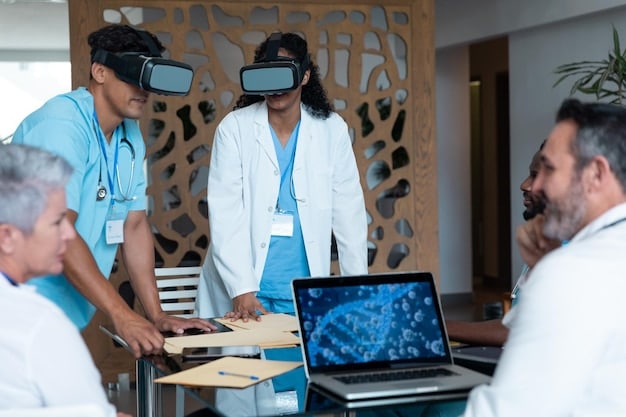AI in Healthcare: Innovations to Watch in 2025

The integration of artificial intelligence is fundamentally transforming healthcare, offering advanced solutions for diagnostics, personalized treatments, and operational efficiency poised for significant breakthroughs by 2025.
The landscape of healthcare is evolving rapidly, driven by technological advancements that were once considered futuristic. Among these,
How Artificial Intelligence is Revolutionizing Healthcare: Innovations to Watch in 2025
stands out as a paradigm shift, promising to redefine patient care, medical research, and operational workflows. As we approach 2025, the impact of AI is no longer a distant possibility but a tangible reality, with innovations emerging that could fundamentally alter how we approach health and wellness.
AI-Powered Diagnostics: Precision and Early Detection
Artificial intelligence is dramatically enhancing diagnostic capabilities, moving beyond traditional methods to offer unparalleled precision and the potential for earlier disease detection. This area represents one of the most immediate and profound impacts of AI in healthcare, particularly as systems grow more sophisticated in interpreting complex medical data.
The ability of AI algorithms to analyze vast datasets, including medical images, genetic sequences, and patient records, far exceeds human capacity. This analytical power is crucial in identifying subtle patterns and anomalies that might elude the human eye, leading to more accurate and timely diagnoses. Early detection often translates directly into improved patient outcomes, especially for conditions where timely intervention is critical.
Advanced Imaging Analysis
One of the most prominent applications of AI in diagnostics is in medical imaging. AI systems can process X-rays, MRIs, CT scans, and other imaging modalities with remarkable speed and accuracy, assisting radiologists in detecting conditions like cancer, neurological disorders, and cardiovascular diseases at very early stages. This capability is not about replacing human expertise but augmenting it, providing a powerful second opinion that helps mitigate diagnostic errors.
- Automated tumor detection in radiology images, improving consistency and speed.
- Identification of subtle markers for neurodegenerative diseases like Alzheimer’s years before symptoms appear.
- Enhanced analysis of retinal scans for early signs of diabetes and other systemic conditions.
Pathology and Laboratory Automation
AI is also making significant inroads into pathology and laboratory diagnostics. Digital pathology, combined with AI, allows for automated analysis of tissue samples, speeding up diagnosis and providing objective, quantifiable results. This reduces the variability often associated with manual microscopic examination and can help pathologists manage increasing caseloads more efficiently.
Beyond imaging, AI algorithms are being developed to analyze biomarker data from blood tests and other bodily fluids. These systems can identify complex correlations and predictors of disease that might not be apparent through conventional analysis. The goal is to move towards predictive diagnostics, where risks can be assessed and mitigation strategies implemented before a disease fully manifests.
The continuous evolution of AI algorithms, coupled with access to ever-larger datasets, means that diagnostic tools will become even more refined and integrated into routine clinical practice by 2025. This move towards precision diagnostics is fundamental to personalized medicine, enabling tailored interventions based on an individual’s unique biological profile. The potential to catch diseases earlier, intervene more effectively, and ultimately save lives is a compelling vision driving AI innovation in diagnostics.
Personalized Treatment Plans and Drug Discovery
The promise of personalized medicine is being significantly realized through the capabilities of artificial intelligence. By analyzing individual patient data, AI can help tailor treatment plans that are far more effective and less prone to side effects than traditional, one-size-fits-all approaches. This deep personalization extends beyond existing therapies into the very heart of drug discovery, accelerating the development of new, highly targeted medications.
Every individual responds differently to treatments, a variability influenced by genetics, lifestyle, and unique disease characteristics. AI excels at processing this multidimensional data to predict how a patient might react to a particular drug or therapy. This predictive power is invaluable for oncologists and other specialists seeking the optimal treatment pathway for complex conditions, moving away from trial-and-error.
AI in Precision Oncology
In oncology, AI is transforming how cancer is treated. By analyzing a patient’s genetic profile (genomics), the specific mutations in their tumor cells, and their medical history, AI algorithms can recommend targeted therapies that are most likely to be effective. This precision minimizes harm to healthy cells and improves the chances of successful treatment, particularly for resistant cancers.
- Matching patients with the most appropriate trial drugs based on their genetic markers.
- Predicting patient response to chemotherapy or immunotherapy regimens.
- Identifying novel drug combinations that enhance therapeutic efficacy while reducing toxicity.
Accelerating Drug Discovery and Development
Traditional drug discovery is a notoriously long, costly, and high-risk process. AI is revolutionizing this by streamlining several stages, from identifying promising drug candidates to optimizing their chemical structures and predicting potential side effects. Machine learning algorithms can sift through vast chemical libraries, simulate molecular interactions, and even design new molecules with desired properties, drastically shortening preclinical timelines.
By 2025, AI is expected to play an even more central role in every phase of drug development. This includes not only the initial discovery but also clinical trial design, patient recruitment, and data analysis. AI can identify optimal patient cohorts for trials, monitor participant safety, and analyze outcomes with unprecedented efficiency, leading to faster approval of life-saving medications. The ability to rapidly identify, test, and bring to market new drugs will reshape pharmaceutical research and therapeutic availability.

The shift towards AI-powered personalized treatment and drug discovery represents a fundamental improvement in healthcare. Rather than broad application, treatment becomes precisely tailored, increasing efficacy and reducing adverse outcomes. This targeted approach not only improves individual patient care but also lays the groundwork for more efficient and cost-effective healthcare systems globally.
Revolutionizing Patient Monitoring and Wearable Technology
The integration of artificial intelligence with wearable technology is fundamentally changing how patients are monitored, moving healthcare from reactive crisis management to proactive, preventative care. By 2025, these advanced monitoring systems will be critical tools, providing continuous, real-time health data that empowers both patients and healthcare providers.
Traditional patient monitoring often involves periodic check-ups or bulky hospital equipment. Wearable devices, from smartwatches to specialized sensors, allow for continuous data collection in a patient’s natural environment. When this data is analyzed by AI, it transforms raw physiological readings into actionable health insights, such as early warning signs of deterioration or trends indicative of chronic conditions.
Real-time Health Insights and Early Warnings
AI algorithms embedded in or connected to wearable devices can detect subtle changes in vital signs, activity levels, sleep patterns, and even mood. These changes, individually minor, can collectively signal an impending health issue. For instance, consistent changes in heart rate variability combined with sleep disturbance might indicate an escalating stress response or even the onset of certain cardiovascular issues, allowing for intervention before a critical event.
- Monitoring glucose levels for diabetics, providing alerts for high or low readings.
- Detecting irregular heart rhythms (like atrial fibrillation) that could lead to strokes.
- Tracking activity and fall detection for elderly individuals, enhancing safety at home.
Remote Patient Management and Chronic Disease Care
The ability of AI-powered wearables to facilitate remote patient monitoring is particularly beneficial for managing chronic diseases. Patients with conditions such as heart failure, COPD, or high blood pressure can have their health status continuously tracked, reducing the need for frequent in-person clinic visits. This not only improves patient convenience but also frees up healthcare resources.
For healthcare providers, this continuous data stream provides a comprehensive, objective view of a patient’s health trajectory that episodic clinic visits cannot offer. AI can flag deviations from baseline, prioritize patients who need immediate attention, and provide insights that guide treatment adjustments. This proactive approach helps prevent acute exacerbations and improves long-term disease management, leading to better quality of life for patients and lower healthcare costs.
By 2025, these technologies will become more sophisticated, seamlessly integrated into daily life, and capable of monitoring an even broader range of physiological parameters. This shift towards intelligent, continuous monitoring will empower individuals to take a more active role in their health and enable healthcare systems to provide more personalized, timely, and efficient care, moving closer to a truly preventative model of medicine.
Augmented Healthcare Workforce and Operational Efficiency
Artificial intelligence is not just transforming clinical aspects of healthcare but also significantly augmenting the workforce and bolstering operational efficiency. Rather than replacing human professionals, AI is designed to automate routine tasks, provide cognitive support, and optimize resource allocation. This allows healthcare staff to focus more on direct patient care and complex decision-making, which are areas where human empathy and critical thinking are irreplaceable.
Healthcare systems worldwide face challenges such as staffing shortages, administrative burdens, and the need to deliver care more cost-effectively. AI offers solutions to these persistent problems by streamlining processes, reducing errors, and making better use of existing resources. The goal is to create a more resilient, responsive, and efficient healthcare environment.
Automating Administrative and Repetitive Tasks
A significant portion of a healthcare professional’s time is often consumed by administrative tasks, from scheduling appointments and managing patient records to billing and compliance. AI-powered tools, such as intelligent chatbots for patient inquiries or robotic process automation (RPA) for administrative workflows, can handle these repetitive tasks with high accuracy and speed. This frees up nurses, doctors, and support staff to engage in more crucial, patient-facing activities.
- AI-driven scheduling and appointment management systems reduce no-shows and optimize clinic flow.
- Automated coding and billing streamline revenue cycles and reduce administrative errors.
- Virtual assistants provide immediate answers to common patient questions, improving patient experience.
Clinical Decision Support Systems
For clinical staff, AI acts as a sophisticated decision support system. These systems integrate vast amounts of medical literature, patient data, and clinical guidelines to provide real-time recommendations and insights. During diagnosis, AI can suggest differential diagnoses based on symptoms and test results. In treatment planning, AI can flag potential drug interactions or suggest evidence-based protocols. This significantly enhances diagnostic accuracy and treatment efficacy, especially in complex cases or for less experienced clinicians.
Furthermore, AI algorithms can optimize hospital operations, such as bed management, surgical scheduling, and supply chain logistics. By predicting patient flow and resource needs, AI ensures that hospitals run more smoothly, minimizing wait times and maximizing the utilization of expensive equipment. This operational improvement contributes directly to patient satisfaction and financial stability for healthcare providers.

By 2025, AI’s role in augmenting the healthcare workforce will be indispensable. It will enable professionals to work smarter, not harder, by automating the mundane and empowering them with advanced analytical capabilities. The result will be a more productive workforce, reduced burnout, and ultimately, a higher standard of care delivered more efficiently across the healthcare continuum.
Ethical Considerations and Regulatory Challenges for AI in Healthcare
As artificial intelligence becomes increasingly embedded within healthcare operations, the discussion around its ethical implications and the need for robust regulatory frameworks gains paramount importance. The transformative potential of AI must be balanced with considerations of patient safety, data privacy, algorithmic bias, and accountability. Without careful navigation, the very benefits AI offers could be undermined by unforeseen ethical dilemmas and a lack of public trust.
While AI promises efficiency and accuracy, its deployment raises complex questions about how decisions are made, who is responsible when things go wrong, and whether these technologies are equitable for all populations. Addressing these challenges proactively is crucial for the successful and responsible integration of AI into healthcare environments.
Data Privacy and Security
AI systems in healthcare thrive on data—patient records, diagnostic images, genomic information. This reliance on sensitive personal health information (PHI) brings significant privacy and security concerns. Protecting this data from breaches, ensuring anonymization where appropriate, and complying with stringent regulations like HIPAA in the US and GDPR in Europe are non-negotiable. Patients must have confidence that their most personal information is handled securely and responsibly by AI systems.
- Ensuring robust encryption and access controls for AI platforms handling PHI.
- Developing clear policies for data usage and sharing, with patient consent at the forefront.
- Implementing techniques such as federated learning to train AI models without centralizing sensitive data.
Algorithmic Bias and Equity
AI algorithms learn from the data they are trained on. If this data is biased—meaning it disproportionately represents certain demographics or undersamples others—the AI system can perpetuate and even amplify existing health disparities. For example, an AI trained primarily on data from one ethnic group might perform poorly or provide inaccurate diagnoses for individuals from another, leading to unequal access to effective care.
Addressing algorithmic bias requires meticulous attention to dataset diversity, rigorous testing, and transparent explainability in AI models. Ensuring that AI benefits all populations, regardless of race, gender, socioeconomic status, or geographic location, is an ethical imperative. Regulatory bodies are grappling with how to mandate fairness and equity in AI deployment, pushing for clear guidelines on what constitutes acceptable bias and how to mitigate it.
The regulatory landscape for AI in healthcare is still nascent but rapidly evolving. Agencies like the FDA are developing frameworks for the approval of AI-powered medical devices and software, focusing on safety, efficacy, and continuous monitoring. However, the unique nature of AI—its ability to learn and evolve—presents challenges for static regulatory approvals. Future regulations will likely emphasize ‘AI as a medical device’ (AI/ML as SaMD) guidelines that allow for adaptive learning while ensuring ongoing oversight.
Ultimately, navigating these ethical and regulatory hurdles requires a collaborative effort among technologists, ethicists, policymakers, healthcare providers, and patients. Proactive engagement will build trust, establish clear lines of accountability, and ensure that AI innovations serve humanity’s best interests rather than creating new problems.
The Future Landscape: Integration and Widespread Adoption by 2025
By 2025, the vision of artificial intelligence deeply integrated into the fabric of healthcare will likely transition from ambitious concept to tangible reality. This widespread adoption won’t be confined to leading academic hospitals but will extend across various healthcare settings, from primary care clinics to specialized research facilities. The focus will shift from developing initial AI tools to seamlessly integrating them into existing workflows, ensuring they are intuitive, effective, and scalable.
The upcoming years will be characterized by a growing maturity in AI applications, moving beyond experimental phases to robust, clinically validated solutions. This will involve overcoming current limitations, such as interoperability issues between different systems and the need for standardized data formats. As these technical hurdles are cleared, the true potential of AI to create a connected, intelligent healthcare ecosystem will emerge.
Interoperability and Data Ecosystems
A critical enabler for widespread AI adoption is the creation of interconnected data ecosystems. Currently, patient data often resides in fragmented systems that don’t easily communicate. By 2025, there will be a stronger push for standardized APIs and data exchange protocols, allowing AI algorithms to access comprehensive, real-time patient information from diverse sources. This seamless flow of data is essential for AI to deliver its full promise in diagnostics, personalized medicine, and operational efficiency.
Electronic Health Records (EHRs) will become even more central, acting as intelligent hubs that feed data to and receive insights from AI applications. The ability to aggregate and analyze data across entire patient populations will also empower public health initiatives, enabling AI to identify disease outbreaks earlier, predict healthcare demand, and inform policy decisions more effectively.
Scalability and Accessibility
For AI to truly revolutionize healthcare, it must be accessible and scalable. This means developing AI solutions that are not just powerful but also affordable and deployable in diverse healthcare environments, including remote and underserved areas. Cloud-based AI services will play a crucial role here, reducing the upfront infrastructure costs for smaller clinics and enabling AI capabilities to be delivered as a service.
Furthermore, by 2025, there will be an emphasis on user-friendly AI interfaces that do not require extensive IT expertise to operate. Physicians, nurses, and administrative staff will interact with AI tools much like they do with other productivity software, making AI a seamless part of their daily routine. The training and education of the healthcare workforce will be paramount to ensure they are proficient in leveraging these new intelligent tools effectively and ethically.
The widespread adoption of AI by 2025 will lead to a healthcare system that is more predictive, preventive, personalized, and participatory. Patients will be more empowered, physicians will have better tools, and healthcare administrators will manage resources with unprecedented insight. This integrated future promises not just incremental improvements, but a fundamental reimagining of what healthcare can achieve for global well-being.
| Key Area | Brief Impact by 2025 |
|---|---|
| 🔬 Diagnostics | Faster, more accurate disease detection via enhanced image analysis and predictive analytics. |
| 💊 Treatment & Drugs | Personalized therapies and accelerated drug discovery reducing development times and costs. |
| 👟 Monitoring | Continuous, real-time health tracking through wearables, enabling proactive care. |
| ⚙️ Operations | Automated admin tasks, enhanced decision support, and optimized resource allocation. |
Frequently Asked Questions About AI in Healthcare
AI improves diagnostics by analyzing vast amounts of medical data, including images (X-rays, MRIs) and patient records. It can detect subtle patterns and anomalies that human eyes might miss, leading to earlier and more accurate diagnoses for conditions like cancer and neurological disorders. This augments, rather than replaces, human expertise, providing a powerful second opinion.
Yes, AI is pivotal in personalized treatment. By analyzing individual patient data such as genetic profiles, medical history, and specific disease characteristics, AI algorithms can predict how a patient might respond to different treatments. This allows healthcare providers to tailor therapies for optimal effectiveness and fewer side effects, especially in areas like precision oncology.
By 2025, AI is expected to significantly accelerate drug discovery and development. It can rapidly sift through chemical libraries, simulate molecular interactions, and even design new molecules. This drastically shortens the preclinical phases, helping identify promising drug candidates faster and more cost-effectively, bringing life-saving medications to market sooner.
Wearable technologies continuously collect real-time physiological data such as heart rate, activity levels, and sleep patterns. AI algorithms analyze this data to provide actionable health insights and early warning signs of potential health issues. This enables proactive, preventive care and facilitates remote patient management, particularly beneficial for chronic disease monitoring.
Key ethical challenges include ensuring patient data privacy and security, as AI relies on sensitive health information. Another significant concern is algorithmic bias, where AI models trained on unrepresentative data might perpetuate health disparities. Addressing these requires robust regulatory frameworks, transparent AI, and diverse datasets to ensure equitable and trustworthy AI deployment.
Conclusion: A New Era for Healthcare
As we look towards 2025, artificial intelligence is unequivocally set to redefine healthcare on multiple fronts. From revolutionizing diagnostics and enabling personalized treatments to streamlining operational inefficiencies and enhancing patient monitoring, AI’s trajectory is clear: it promises a future where healthcare is more precise, proactive, and accessible. While challenges related to ethics, data security, and regulatory frameworks persist, ongoing advancements and collaborative efforts are actively addressing these concerns. The integration of AI into healthcare is not merely an upgrade but a fundamental paradigm shift, fostering an intelligent ecosystem poised to deliver unprecedented benefits to patients and healthcare systems worldwide, ushering in a truly new era for health and wellness.





